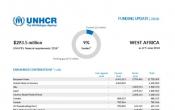Burkina Faso
Operation: Burkina Faso
Location
{"longitude":-2,"latitude":12,"zoom_level":0,"iso_codes":"'BFA'"}
By clicking on the icons on the map, additional information is displayed.
Key Figures
| 2017 year-end results | |
| 0 | cases of refoulement registered |
| 100% | of people of concern were registered on an individual basis |
| 100% | of people living with HIV had access to HIV services |
| 89.7% | of adult people of concern received ID cards |
| 73% | of livebirths attended by skilled personnel |
| 62% | of children received birth certificates |
| 2018 planning | |
| 100% | of people of concern will receive protection and documentation |
| 100% | of households in the camps will have access to sustainable shelter |
| 100% | of the people identified at risk of statelessness will be sensitized and assisted on the procedures for obtaining documents attesting to their nationality in Burkina Faso |
| 70% | of the population will receive livelihood support within the livestock, artisan, trade and service provision |
| 2,000 | refugee children will be enrolled in primary education |
Latest Updates
People of Concern
4%
Decrease in
2016
2016
| 2016 | 32,676 |
| 2015 | 34,160 |
| 2014 | 32,097 |

[["Refugees",32552],["Asylum-seekers",124]]
Loading ...
Burkina Faso
< Back
2017
{"categories":[2013,2014,2015,2016,2017,2018],"budget":[32.9082851,25.70863502,20.5672092,21.67917582,24.785447777,24.65099569],"expenditure":[24.16905105,17.18614105,14.06340692,14.30327322,16.88336426,null]}
{"categories":[2013,2014,2015,2016,2017,2018],"p1":[32.9082851,25.70863502,20.5672092,20.97155543,24.274910527,24.14788135],"p2":[null,null,null,0.70762039,0.51053725,0.50311434],"p3":[null,null,null,null,null,null],"p4":[null,null,null,null,null,null]}
{"categories":[2013,2014,2015,2016,2017,2018],"p1":[24.16905105,17.18614105,14.06340692,14.06146278,16.55595915,null],"p2":[null,null,null,0.24181044,0.32740511,null],"p3":[null,null,null,null,null,null],"p4":[null,null,null,null,null,null]}
Loading ...
CHOOSE A YEAR
- 2014
- 2015
- 2016
- 2017
- 2018
Operational Context
As many other countries in West Africa, Burkina Faso is facing enormous economic, political, and social challenges. Economically, the country is expected to show a growth rate of around 6.7 per cent according to the African Development Bank. This growth is mainly supported by mining, construction and public works, trade and agriculture. Despite this strong growth, the poverty rate remains relatively high at 40.1 per cent.2017 was marked by the resurgence of strikes and calls from civil society organizations for justice related to political events in 2014 and 2015. Burkina Faso’s security situation was characterized by a number of terrorist attacks in the Sahel, which has led to the internal displacement of some 14,800 people as well as the closure of schools and health centres in the Soum and the Oudalan provinces. Consequently, for security reasons, refugees who have settled outside camps will be relocated to safe areas identified by the Government of Burkina Faso, starting 2018.
Despite the deteriorating security context in the Sahel, Burkina Faso continued its efforts to facilitate, foster and preserve asylum space. No cases of refoulement were recorded during 2017.
Population trends
During 2017, the number of refugees and asylum-seekers in Burkina Faso decreased from 34,200 to 24,200. This was mainly due to the facilitated voluntary repatriation of Malian refugees that has been ongoing since 2014. In 2017, approximately 5,000 Malian refugees returned to their country of origin either spontaneously or through facilitated return. This brings the total number of repatriated refugees to approximately 10,000 since 2014.Key achievements
The preservation of the protection space for asylum-seekers was increasingly challenged in 2017. The repeated terrorist attacks in Burkina Faso, which are believed to come from Mali, led to stigmatisation of refugees who are perceived to be aligned with the perpetrators. This perception is exacerbated by the attacks against national army, particularly police forces who provide security in the refugee camps. To avoid the deterioration of asylum space due to the perception that refugees may be aligned with groups perpetrating acts of terrorism, UNHCR increased advocacy with the Government of Burkina Faso and its ministry in charge of refugee affairs to:- Reinforce support to the maintenance of the civilian and humanitarian character of refugee camps;
- Enhance outreach to inform refugees of their rights and obligations;
- Reinforce institutional support to the Government to improve the legal framework for asylum.
Unmet needs
In terms of energy supply for domestic use, some 1,600 households are estimated to not have access to energy.Working environment
Despite the signing of the Agreement for Peace and Reconciliation in in Mali June 2015, insecurity continues to hamper conditions conducive for return. In this regard, UNHCR remains grateful to the host government for continuing to maintain an open asylum space and for granting refugees access to local services and the labor market. Protection concerns have been raised at recent national events which mainly present the risks of ethnic stigmatization that threaten local stability in the main refugee-hosting region.In Burkina Faso, 97 per cent of Malian refugees live in the Sahel region, the majority in two refugee camps, where they are subject to harsh climatic conditions, and where there is increasing competition over natural resources and decreasing livelihoods opportunities.
Jointly with the hosting government and other partners, UNHCR protects the fundamental rights of and provides life-saving assistance to refugees. .

